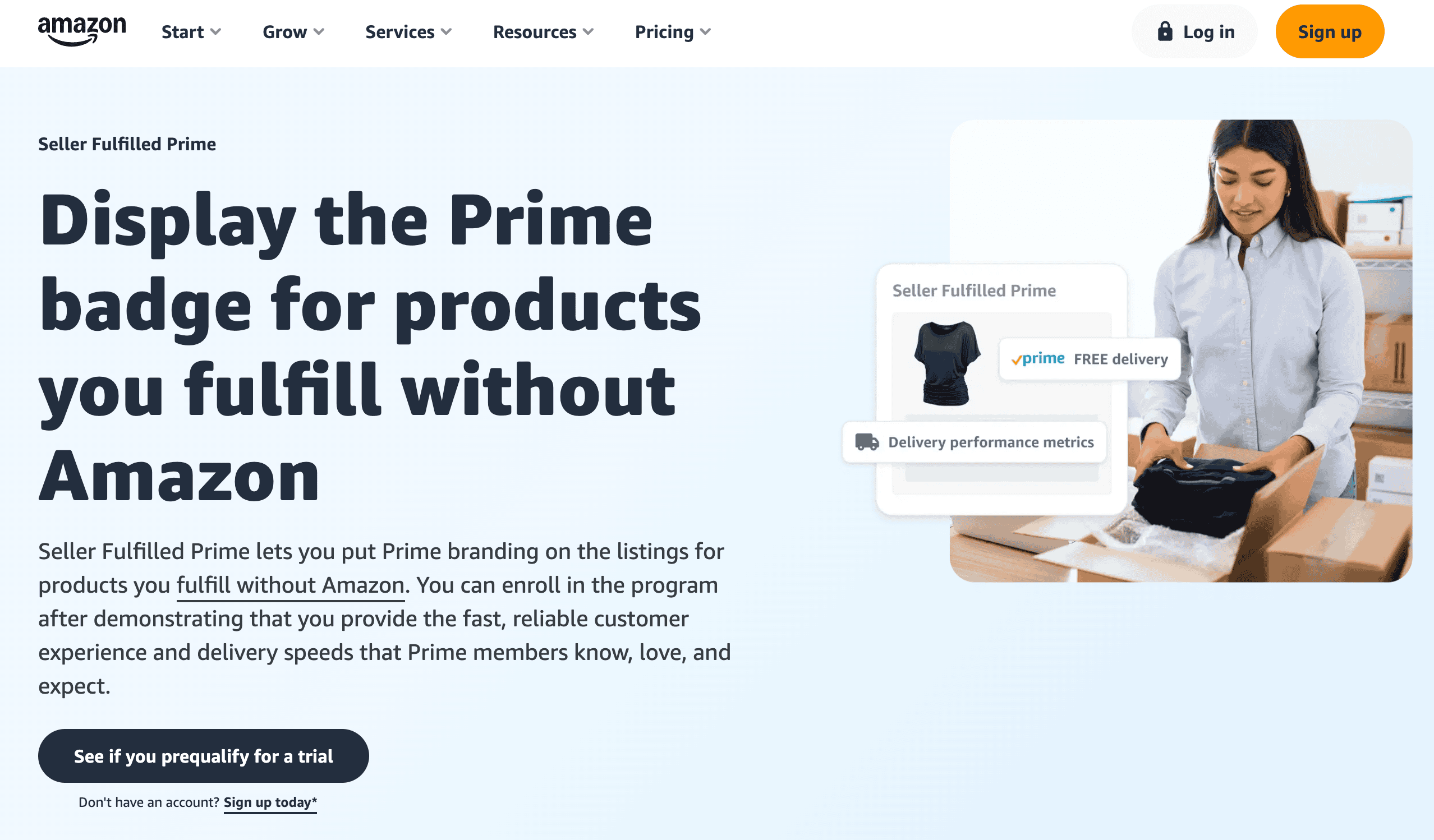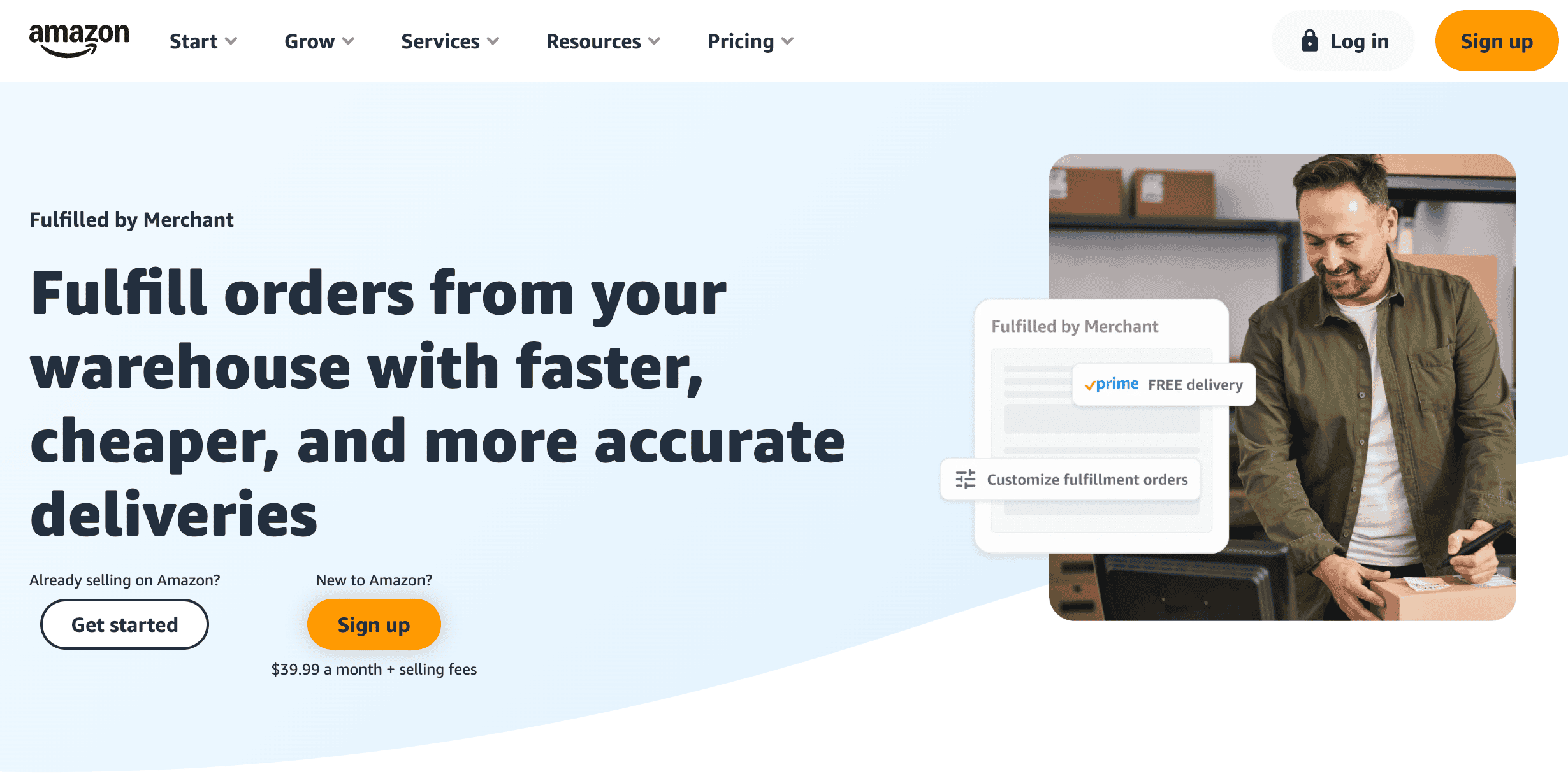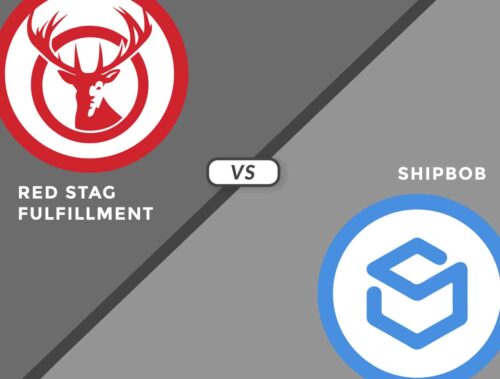Fulfilled by Amazon (FBA) is a popular choice for ecommerce businesses looking to streamline order fulfillment. But it comes with trade-offs—limited branding control, high fulfillment fees, strict product requirements, and scalability challenges.
If these limitations are holding you back, it’s time to explore Amazon FBA alternatives. The right fulfillment solution can reduce costs, give you more control over your operations, and help you scale effectively.
But what are the best FBA alternatives to consider? Below, we’ll review three top options, key factors to consider when choosing one, and tips for making a smooth transition.

TL;DR:
Top FBA alternatives:

Seller-Fulfilled Prime (SFP)

Fulfillment by Merchant (FBM)

A 3PL partner that supports FBM and SFP
3 of the best FBA alternatives
The right fulfillment partner for your ecommerce business should align with your goals and solve common FBA challenges. Whether you need an FBA alternative to ship bulky products or want more flexibility with your branding, there are options that can better meet your needs.
1. Seller-Fulfilled Prime (SFP)

With Seller-Fulfilled Prime (SFP), you can fulfill Amazon Prime orders from your own warehouse while maintaining access to Prime customers. This allows you to retain control over the fulfillment process while still benefiting from the Prime badge, which can help boost sales.
However, SFP has strict performance requirements. To stay eligible, you need to maintain a minimum on-time delivery rate and a limited cancellation rate. You also need to prequalify and pass a trial period before getting started.
Despite its benefits, consistently meeting these requirements can be challenging. Partnering with Red Stag can help you navigate SFP’s standards and stay compliant, especially if you ship high-value or heavy products.

SFP eligibility requirements (subject to change): On-time delivery rate of 93.5% or higher, valid tracking rate of 99% or higher, cancellation rate of 0.5% maximum, and delivery speed requirements based on size
2. Fulfillment by Merchant (FBM)

Instead of relying on Amazon, Fulfilled by Merchant (FBM) allows you to handle storage, packing, and shipping yourself. This option provides greater control over fulfillment operations and often comes with lower fees compared to FBA.
That said, it does have some drawbacks. Without Prime branding, it can be harder to attract Amazon customers, and managing order processing and fulfillment in-house requires more time and resources that could affect other aspects of your business.
If you want the benefits of FBM while reducing the operational burden, partnering with Red Stag can help streamline fulfillment and operations.

FBM best use cases: You are shipping heavy or large items, prefer using your own package branding instead of Amazon’s, have a warehouse, or want to avoid complex pricing and higher fees
3. A 3PL partner
Working with a third-party logistics (3PL) provider can save your online store time and money while improving efficiency. A 3PL partner handles supply chain processes for you, including storage, packing, shipping, and returns, allowing you to focus on growing your business instead of managing logistics.
A trusted 3PL can help you reduce fulfillment costs, scale your business as it evolves, and gain more control over branding. It also helps you avoid FBA’s higher fees while supporting products that are difficult to ship through FBA, such as bulky or high-value items.
If you’re considering this route, compare some of the best 3PL companies available to find one that fits your fulfillment needs.
Reasons to look into FBA alternatives based on business needs
Long-term storage fees, operational inefficiencies, and product restrictions are just a few reasons to explore other fulfillment options. Depending on your business needs, the drawbacks of using FBA may outweigh its benefits. Let’s take a closer look at some of the top reasons to consider other fulfillment options.
High fees and costs
FBA may help drive sales, but its pricing structure can also come with higher fulfillment and shipping costs that cut into your profit margins. If you sell high-value or bulky/large products, you’re more likely to pay even more in Amazon FBA fees.
Some of the more common high-cost fees include:

Pick-and-pack charges for multi-channel fulfillment or for items larger in size, shipping weight, or dimensional weight.

Long-term storage or aged inventory surcharges for products stored in an Amazon warehouse for more than 180 days.

Fees for standard-size items that consistently have low inventory levels compared to customer demand.

Higher monthly storage fees for bulky items that require more space.
Limited branding control
Building a recognizable brand is key to standing out and staying competitive in ecommerce. When customers know your brand, they’re more likely to buy from you instead of a competitor.
Using FBA can make it harder for Amazon sellers to create a unique identity. It restricts opportunities for branded packaging and inserts, limiting your ability to establish a recognizable brand that stands out among competitors.
From the customers’ perspective, they purchase products “via Amazon,” with packaging featuring Amazon’s labeling and logos. This shifts the focus to Amazon instead of your brand. Your items also need to meet strict FBA packaging requirements regarding type, size, and other specifications.
Scalability issues
Your goal is to grow your business, but that growth can bring challenges that might make FBA fulfillment less practical. If you already use this service, you may eventually find that your ecommerce business outgrows its model.
Exploring other ecommerce fulfillment solutions can help you scale more effectively. You may need an option that supports higher order volumes, provides more storage space for larger items, or accommodates specialized shipping needs.
Signs that FBA may no longer be the right fit include:

Order volume increases that exceed what FBA can handle.

Larger or heavier products that don’t fit within FBA’s weight and size limits.

Items that require complex assembly before shipping.

Fragile or high-value products that need specialized handling.
FBA may also lack cost-effective storage solutions as your business expands, especially if you sell bulky or high-value items.
Product restrictions
Depending on what you sell, FBA may not be an option at all. Amazon has several product restrictions, prohibiting some items entirely and imposing packaging and labeling requirements on others. Some products, such as meltable goods, are only accepted during specific times of the year.
Examples of products restricted by Amazon FBA:
01
Hazardous materials (hazmat) or dangerous goods like automotive oils, apparel stain remover, spray deodorants, and cell phones
02
Expiration-dated items, including food, personal care products, and medical devices
03
Alcoholic beverages
04
Automotive tires
05
Batteries in loose packaging
06
Meltable products, including chocolate and wax items
07
Lithium batteries and products containing lithium batteries (unless properly labeled)
08
Gift cards and gift certificates
09
Defective products
What to look for in an FBA alternative
If FBA isn’t the right fit for your ecommerce business, or you’re considering switching, you’ll need an alternative that meets your fulfillment needs. That means comparing different options and looking for key factors before making a decision.
Customizable fulfillment solutions
Standard fulfillment services may not work for every business. Some companies need a provider that can handle large or heavy items like TVs or furniture, while others may require kitting, bundling, or other services that some providers don’t offer.
Choosing a provider with customizable fulfillment solutions helps make sure their services align with your business needs. Examples of customizable options include:

Kitting and assembly

Bundling

Specialized inventory storage solutions, including large item storage

Dropshipping

Pick and pack

Omnichannel fulfillment

Inventory planning

Same-day order fulfillment
Cost transparency
One of the biggest challenges with FBA is its complex fee structure. Costs can vary based on fulfillment, storage, inbound defects, returns, and product size—making it difficult to predict expenses.
Look for a fulfillment company that offers clear and predictable pricing structures so you know exactly what you’ll pay. When comparing pricing, consider:

Storage fees

Shipping services

Picking and packing fees

Kitting and other custom solutions

Return processing fees
At Red Stag, we offer custom fulfillment costs based on your company’s unique needs—so you only pay for the services you actually use. We also offer industry-leading guarantees to support customer satisfaction, efficiency, and cost-effectiveness for your business. This includes a zero-shrinkage policy (you never lose inventory), 100% order accuracy, and fast shipping at competitive shipping rates.
Reach out to Red Stag to learn how we can help meet your fulfillment needs.
Scalability
Your ideal provider should be able to grow with your business, especially during seasonal spikes or high-growth periods. A provider that scales with you helps prevent disruptions, keeps your customers happy, and ensures orders continue flowing in.
When comparing FBA alternatives, check customer testimonials and case studies to see how well a provider supports business growth. If you plan to sell on multiple platforms beyond Amazon, look for a multi-channel fulfillment provider to streamline fulfillment processes across different sales channels.
Accuracy and reliability
Order accuracy is essential for maintaining customer satisfaction and avoiding lost sales. Inaccurate shipments lead to returns, refunds, and a poor customer experience—hurting your business in the long run.
Check providers’ metrics—such as order accuracy rates, on-time delivery guarantees, and quality of their customer support—when evaluating alternatives. Many customers have grown accustomed to Amazon’s two-day Prime delivery, so choosing a provider that offers fast, reliable shipping is crucial. Red Stag provides fast shipping, including two-day shipping, through strategically located fulfillment centers, helping you meet customer expectations.
Specialized expertise
If your products require special handling, it pays to partner with a provider that has the right experience. Some fulfillment providers specialize in large, bulky, or high-value items, ensuring they’re packed and shipped with care.
Some industries that benefit from working with a specialized 3PL include:

Consumer electronics, such as TVs or computers

Healthcare, such as medical devices or supplies

Pharmaceuticals

Manufacturing

Food and beverage

Retail, especially seasonal items
Get in touch to learn more about how Red Stag supports Amazon fulfillment.
How to transition from FBA to your new fulfillment solution
If you’ve depended on FBA for fulfillment, switching providers requires careful planning to avoid disruptions to your business. A structured approach can help make the transition smoother and minimize operational risks.
Creating a transition timeline
Setting a clear timeline helps prevent issues like inventory discrepancies and data migration errors. Breaking the process up into phases—planning, testing, and full migration—can keep everything on track.
Planning involves determining the details of your transition, including how you’ll transfer inventory and data. Testing allows you to run integrated systems to confirm smooth operations and address any issues. Full migration is the final phase, where you complete the switch to your new provider and monitor performance to ensure everything runs as expected.
The following steps can help you create a timeline:

Assess your current inventory.

Coordinate with your new fulfillment provider.

Plan your cutoff date for FBA use.

Coordinate your inventory transfer, including necessary stock adjustments.

Migrate customer and fulfillment data to your new provider.
Managing inventory during the switch
Switching to a new fulfillment provider can lead to inventory shortages or other problems if not carefully managed. Using inventory management systems can help track stock movement and create a smoother transition. Be sure to maintain adequate stock levels to prevent stockouts.
To minimize risks, consider transferring slower-selling products first, as running low on these items is less likely to affect your operations. For best-selling or fast-moving products, a gradual transfer is a better approach. Moving everything at once can leave key items out of stock, leading to delays and a poor customer experience.
Communicating changes to customers
Even with careful planning, delays or other disruptions may still impact your customers. Keeping them informed about potential changes that may lead to longer delivery times can help manage expectations and reduce frustration. Clear, proactive communication builds trust during the transition.
| Communication Strategy |
Example |
|---|---|
| Email updates | Notify customers about transition progress. |
| SMS updates to subscribers | Send text updates with expected completion dates and invite questions or feedback. |
| Website notices | Post an update on your homepage with links to FAQs. |
Maintaining sales momentum during transition
To avoid sales disruption:

Focus on customer retention strategies like loyalty programs.

Run promotions to encourage continued sales.

Align marketing efforts with the transition timeline.
Maintaining consistent marketing efforts helps prevent visibility gaps that could hurt brand recognition.
Monitor key performance metrics to identify and resolve issues promptly:

Delivery times

Order accuracy

Inventory accuracy

Customer satisfaction
Choose a fulfillment partner that grows with your business
Finding the right Amazon FBA alternative gives you more control over fulfillment, reduces costs, and supports long-term growth. Whether you need greater brand flexibility, better scalability, or a solution for shipping oversized products, choosing the right fulfillment partner is key to keeping your business running smoothly.
At Red Stag, we provide transparent pricing, customized solutions, and industry-leading accuracy guarantees to help businesses scale with confidence.
Reach out to learn how we can support your fulfillment needs. Contact us to get started.













